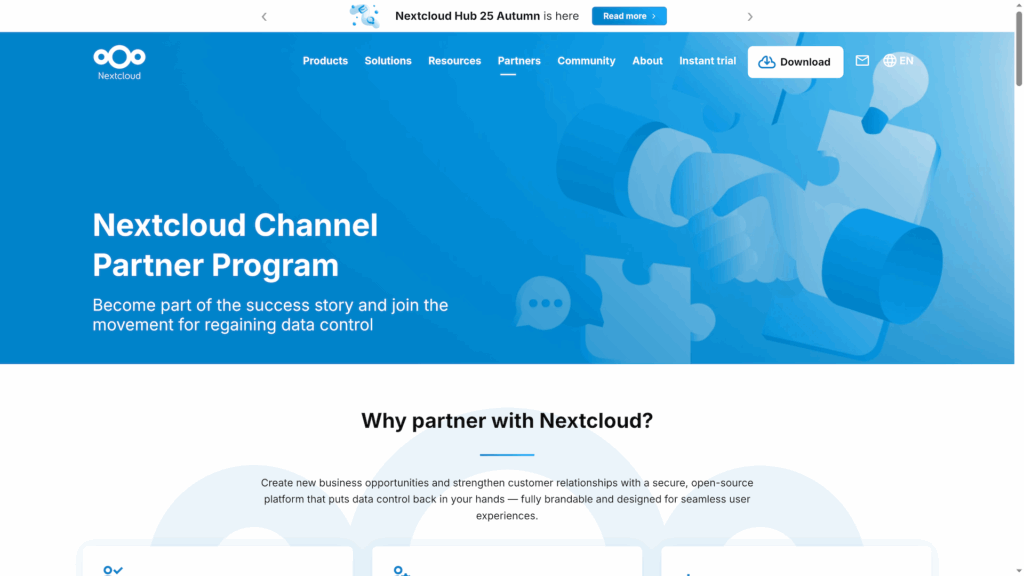By deploying Nextcloud, the BMWET strengthens control over its own data and sets an important example for the Austrian public sector.
- In less than a year, the Federal Ministry for Economic Affairs, Energy and Tourism (BMWET) rolled out Nextcloud for digital collaboration, operated on its own infrastructure in Austria.
- The decision strengthens security, data protection and independence in line with GDPR and the NIS2 directive.
- The Ministry is taking an important step towards digital sovereignty, a topic of growing strategic relevance for government and public administration.
Vienna, October 22, 2025 – The Austrian Federal Ministry for Economic Affairs, Energy and Tourism (BMWET) has restructured its digital collaboration environment, taking a strong stance for digital sovereignty. Instead of relying entirely on cloud services from non-European providers, the Ministry chose a solution that puts security, data protection and control first. By introducing Nextcloud on its own infrastructure, BMWET aims to reduce technological dependency on external providers while ensuring modern, efficient workflows.
The Ministry faced the challenge of redefining digital collaboration at a time when questions around data protection, compliance and technological dependence have become increasingly important. A risk analysis showed that a solution based entirely on US cloud services would create legal uncertainty around the protection of sensitive information. With Nextcloud, BMWET chose an approach that combines data sovereignty, functionality and ease of use.
“We are responsible for a large amount of sensitive data – from employees, companies and citizens. As a public institution, we take this responsibility very seriously,” says Florian Zinnagl, CISO of BMWET. “That is why we consider it critical to rely on cloud solutions from non-European corporations for processing all this information.”
With Nextcloud, the Ministry now operates a platform that meets the highest standards of data protection and transparency. All sensitive data remain on Austrian servers, while communication and collaboration take place within a system fully under the Ministry’s own control.
“Digital sovereignty is a key requirement for Europe’s future. The fact that the Austrian Ministry of Economic Affairs is taking the lead here is a strong signal to other public institutions to promote their own solutions and reduce dependencies,” says Frank Karlitschek, CEO and founder of Nextcloud. “That the implementation was completed within just a few months shows that even complex IT projects in public administration can be successfully realized with the right support.”
“After a testing phase, the new platform was introduced for around 1,200 employees in just a few months. An extensive information campaign, clear communication, training and a gradual transition ensured high acceptance and a smooth process,” says Martin Ollrom, CIO of BMWET. “By integrating the new solution into existing systems, we were able to modernize our digital service catalog and collaboration processes without changing established workflows.” While the Ministry continues to use existing solutions such as Microsoft Teams in some areas, the foundation for gradual independence has been laid.
With this step, BMWET joins a group of pioneering public organizations such as the German state of Schleswig-Holstein, which under the leadership of Dirk Schrödter has fully transitioned to a digitally sovereign open source workplace. Their success could serve as a model for other public institutions in Austria and across the EU, at a time when digital sovereignty is increasingly seen as a strategic prerequisite for resilience, innovation and political autonomy.
“We are following with great interest how Schleswig-Holstein is advancing its digital sovereignty strategy. It shows that open source is not just a technical but a strategic approach – one that enables more independence, innovation and security in public administration. We find this consistent implementation impressive and are in contact with the responsible teams at state level. We also want to take many of the alternative approaches from that project into account within our own ministry,” says Florian Zinnagl.
The example of BMWET shows that digital sovereignty is not a theoretical goal but can be achieved step by step through pragmatic decisions and a clear strategic direction.
About Nextcloud
Nextcloud is the world’s most popular privacy-focused collaboration platform. It is used by tens of thousands of private and public organizations and tens of millions of private individuals to stay in control of their sensitive data and ensure privacy compliance.
With Nextcloud, users can edit and share documents, chat and hold video conferences, and manage emails, contacts and calendars via easy web and mobile apps. The open-source software has a modular design and can be extended with hundreds of apps. It runs on premises in a private cloud or with a trusted provider.
Founded in 2016, Nextcloud is fully employee-owned and has grown organically ever since. Learn more at www.nextcloud.com.
Press contacts
Nextcloud GmbH
Jos Poortvliet
Phone: +49 (0) 171 121 7528
pr@nextcloud.com


